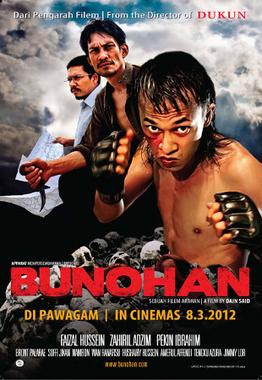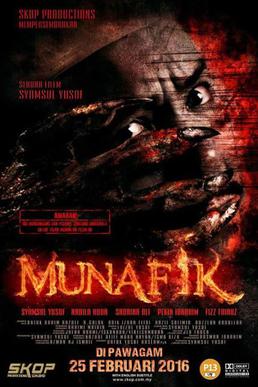KRU is a Malaysian pop boy band formed in 1992. The group comprises three brothers, namely Datuk Norman Abdul Halim, Datuk Yusry Abdul Halim and Edry Abdul Halim'. Apart from revolutionising the Malaysian music scene with their blend of pop, R&B and hip hop, Dato' Norman Abdul Halim heads a successful business empire, KRU Studios, with Dato' Yusry Abdul Halim specialising in film, media content and live events, whilst Edry Abdul Halim is a successful composer/producer.

The National Film Department of Malaysia, abbreviated FNM, sometimes Jabatan Filem Negara (JFN) or informally the Malaysian Film Unit; was a Malaysian state-owned film organization. It is the country's first film studio and the government department under the Malaysian Ministry of Communications and Multimedia, which was responsible for the filming and documentation of national events as well as producing factual and unscripted contents. In its heyday, FNM became the country's most prominent film agency. Its corporate emblem features a jumping Malayan tiger, which was synonymous with the agency and its headquarters were located in Petaling Jaya, Selangor.

Datuk Mohamed Noor bin Shamsuddin, known professionally as Rosyam Nor, is a Malaysian actor, television host and film producer.

The National Film Development Corporation Malaysia, abbreviated FINAS, is the central government agency and governing body for the film industry of Malaysia. Its role is to regulate economic and commercial matters related to the film industry in Malaysia and responsible for film policies and programs to ensure the economic, cultural and educational development of the Malaysian film industry as well as providing funds to filmmakers and film studios. FINAS is similar to the Film Development Council of the Philippines in the Philippines and Motion Picture Association of America in the United States. In 2013, the corporation was merged with Filem Negara Malaysia (FNM) to form a sole film agency.

Dato' Afdlin Shauki bin Aksan is a Malaysian producer, screenwriter, director, actor, comedian, singer, songwriter, and television presenter and politician.
Adibah Noor Mohamed Omar was a Malaysian singer, actress and master of ceremonies. She made her start in the entertainment industry in 1995 and had gone on to star in films such as Sepet and Gubra.
Noraishah "Nasha" Abdul Aziz is a Malaysian model and an actress. She was born in Kampung Pandan, Kuala Lumpur, Malaysia.
Rosiah Chik or Rosiah Abdul Manaf (1931–2006) was Malay traditional singer particularly of asli and ghazal songs, made famous in the 1960s–1970s in Malaysia. She was also known as Mak We among the people of the industry and her fans.

Nasrul Suhaimin bin Saifuddin, known professionally as Bront Palarae, is a Malaysian actor, film director, screenwriter and producer.

The Ministry of Communications is a ministry of the Government of Malaysia that is responsible for digitalisation, communications, multimedia, radio broadcasting, digital terrestrial television broadcasting, other media broadcasts, information, personal data protection, special affairs, media industry, film industry, domain name, postal, courier, mobile service, fixed service, broadband, digital signature, universal service, international broadcasting, and content.

Bunohan is a Malaysian Malay-language action drama film, written and directed by Dain Iskandar Said and released in Malaysia on 8 March 2012. The film features actors Faizal Hussein, Zahiril Adzim and Pekin Ibrahim in leading roles. Bunohan is the second film to be directed by Dain Said. Bunohan had its world premiere at the 2011 Toronto International Film Festival where it was praised for its solid, visceral storytelling and arresting photography.

Mohd Syamsul Mohd Yusof is a Malaysian actor, film director, writer, producer, rapper and singer. He is the son of producer and director Yusof Haslam. He is the youngest director to win the Malaysian Film Festival for Best Director award, doing so at the age of 25.

Sangeeta Krishnasamy is a Malaysian actress and model. She did a small role in Kollywood movie after making an appearance in Venkat Prabhu's hit Goa and as the female lead in ZHA among famous South Indian film actors. In 2015 she was the female lead for two hit Malaysian Tamil movies Vetti Pasanga & Vennira Iravugal. Vennira Iravugal became an acclaimed Malaysian Tamil movie after it was screened in several film festivals around Europe and won a special jury award at the Norway Tamil Film Festival in 2014, subsequently taking home all 5 awards in all categories at the Malaysian Kalai Ulagam Awards in 2015. She is amongst the top actresses in the Malaysian Film Industry.

Polis Evo is a 2015 Malaysian buddy cop action comedy film directed by Ghaz Abu Bakar and written by Joel Soh, Kyle Goonting, Anwari Ashraf and Adib Zaini. The film casts includes Shaheizy Sam, Zizan Razak, Nora Danish, Mimi Ernida, Hushairy Hussein and Pablo Amirul. The film tells the story of two police officers, Inspector Khai and Inspector Sani who have very different personalities but are forced to work together to bring down a drug trafficking operation. The film was released theatrically on September 17, 2015, nationwide.

KIL is a 2013 Malaysian Malay-language mystery drama film directed by Nik Amir Mustapha and It was written by Nik Amir Mustapha, Rewan Ishak and Khairulzaman Dzulkifly and produced by Tengku Iesta Tengku Alaudin.

Jagat is a 2015 Malaysian crime drama film. Set in the early 1990s, the story follows a mischievous 12-year-old boy named Appoy and his relationships with his father, Maniam, and his uncles, former drug-addict Bala and local gangster Dorai. The boy faces pressure from his father to focus on school, but he is drawn to his uncle's life of crime.

Ola Bola is a 2016 Malaysian Malay-language sport drama film directed by Chiu Keng Guan starring JC Chee, Luqman Hafidz, Saran Kumar, Marianne Tan, Katrina Ho, Frankie Lee and Bront Palarae. The film was inspired by the glories of the Malaysia national football team which successfully entered the 1980 Summer Olympics. The film was released in Malaysian cinemas on 28 January 2016. As of November 2019, Ola Bola is currently ranked the tenth-highest grossing Malaysian film of all-time.

Munafik is a 2016 Malaysian Malay-language supernatural horror film directed by Syamsul Yusof. It was his ninth film as well as his second horror film after Khurafat (2011) and also the first film in a planned Munafik trilogy. It stars Syamsul himself, Fizz Fairuz, Pekin Ibrahim and Nabila Huda. The film depicts Adam, a Muslim medical practitioner who is unable to continue with his job and accept the reality of his wife's death. After he meets Maria, unsettling things start to happen.

Vedigundu Pasangge is a 2018 Malaysian Tamil language crime comedy film. It was the final instalment of Pasangge trilogy film series after Vilayaatu Pasange (2011), and Vetti Pasanga (2014). Vimala Perumal directed the movie with an ensemble cast including Sangeeta Krishnasamy, Denes Kumar, David Anthony, and Thangamani Velayuda. Music and background music were scored by composer duo Vivek–Mervin.













